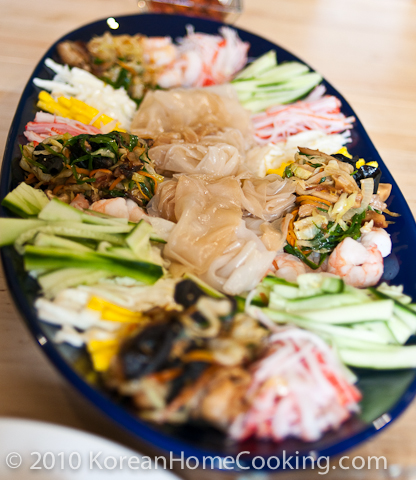
Patbingsu or 팥빙수 via Maangchi

Seafood and Vegetables in Mustard Sauce or 양장피 잡채 via Migi's Kitchen
One distinct quality of Korean food is the number of dishes that involve mixing and stirring. You can see this in dishes like bibimbap (비빔밥, 'mixed rice'), bibim mandu (비빔만두, 'mixed dumplings'), and bibim guksu (비빔국수, 'mixed noodles') as well as deopbap (덮밥, 'covered rice') dishes and desserts like patbingsu. Korea is a food culture that loves to mix and stir things up. In fact, bibimbap was once called 골동반 (pronounced 'gohldoengbahn'), represented as 骨同飯 in hanja (Sino-Korean characters), containing the meaning 'to mix in a jumble' according to professor Choi Joon-Shik. The point of mixing it up is to meld the flavors of each ingredient so that the resulting dish brings out the combined and individual flavors of each ingredient (Choi). There is something about this fusion that manifests the collective psyche of Koreans in such a magnificent way. Each ingredient is added for the unique contribution it brings to the flavor of the dish, but then, all ingredients are combined to bring out the collective flavor of the whole (Choi), a wonderful mishmash of different textures and flavors. This fusion of diverse ingredients creates a dynamism that cannot be achieved by individual ingredients alone. It is this complexity of textures and flavors that creates the richness and depth that stimulate and tantalize the tastebuds. It is through this potpourri that one can see the rich and dynamic spirit of Korean people and culture, the sense of oneness or uri (우리, 'us') mentality that is characteristic of the people and the passion that can be seen in many Koreans, our movies, and our dramas. Koreans really love a deep and hearty flavor known as 고소한 맛 (pronounced 'gosohahn maht') and bibim dishes do an excellent job of bringing that out.
Here are some wonderful examples of the mixing that Korean dishes are known for:

Bibim Naengmyeon or 비빔냉면 via 무지개의 달콤한 세상

Bibim Mandu or 비빔만두 via Misty Yoon

Dolsot Bibimbap or 돌솥 비빔밥 via My Epikorean

Bibim Guksu or 비빔국수 via Beyond Kimchee

via One Fork, One Spoon

(Nalchi Ahl - 'flying fish roe' ; Hwe - 'raw fish')
Posted by tastingkorea

No comments:
Post a Comment
Please do not spam the comments section with links unrelated to the post. If you have an informative link that is directly relevant to the topic, you may add it to your comment.